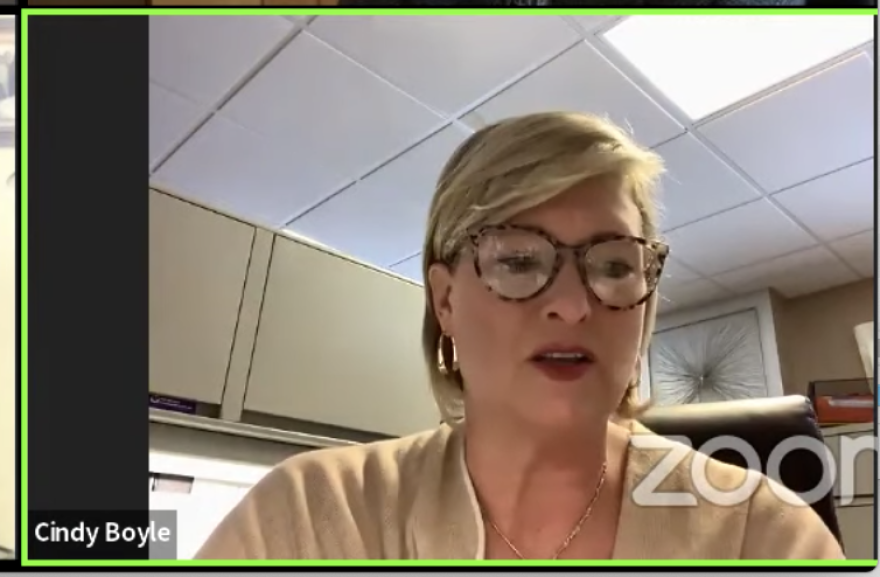People concerned about the public health risks posed by PFAS faced disappointment after a Wisconsin Natural Resources Board vote Wednesday.
The board approved some limits on two of the most studied forever chemicals, but action fell far short of what the Department of Natural Resources and residents with contaminated wells were pushing for.
February 23 was a date people like Cindy Boyle were eagerly waiting for the Natural Resources Board to consider proposed PFAS standards. They’ve been in development for over two years.
Residents of Boyle’s Town of Peshtigo and neighboring Marinette have been grappling with contaminated wells since they learned PFAS from a nearby firefighting foam production and the testing facility had tainted their groundwater.

“For four and a half years, I have been fighting every single day to set PFOA and PFOS standards. We are all on drinking wells in the town of Peshtigo — 4,000 people. One third of our parcels are impacted. [PFAS] continue to migrate. If we don’t have state standards, there is nothing we can do,” Boyle said.
A growing number of Wisconsin communities are dealing with wells contaminated with the forever chemicals. PFAS are called that because they don’t break down, and they accumulate in the bodies of people and wildlife.
Currently, the federal Environmental Protection Agency has a lifetime drinking water health advisory of 70 parts per trillion for two of the most studied PFAS.
But people like Boyle want a much lower limit.
The Wisconsin DNR conferred with the state Department of Health Services to formulate a proposed 20 parts per trillion standard for drinking water and groundwater. As for surface water, the agency floated eight parts per trillion limit.
The Natural Resources Board took testimony, on and debated, all three standards Wednesday.
Wausau Mayor Katie Rosenberg told the board the state needs strict standards. She said her community doesn’t know where to turn.
“At the beginning of this year, the City of Wausau voluntarily tested for PFAS because a neighboring community found that one of their wells exceeded both the DNR and the EPA health advisories. And it’s the right thing to do. When we got our results, we found out while we are below the EPA advisory, every one of our six wells exceeds the DNR and DHS advisory,” Rosenberg said. “I’ve pleaded with our partners at state and federal governments to guide help us through this.”
But longtime Natural Resources Board member Dr. Fred Prehn challenged Rosenberg. He’s a Wausau resident, and he berated the mayor and local government, saying they were creating hysteria in the community.
“You want an instant fix that’s been around for generations at least my generation, and there will be fixes in place. But the fact that you put the Town of Wausau in hysteria is unacceptable to me, and that’s exactly what’s going on up there. I hope the people of Wausau understand that’s being dealt with in a systemic, thoughtful, legal way,” Prehn said.
Scott Manley with Wisconsin Manufacturers & Commerce argued that the DNR overstepped its authority in crafting the proposed standards.
“Although we believe there are numerous legal problems with the three rules, I want to focus my comments on two specific fatal flaws with the rules. The first being the DNR’s failure to follow the rulemaking requirements and the second the unlawful use of combined standards,” Manley said.

Some Natural Resources Board members raised their own concerns when voting on the three sets of standards, including Bill Bruins.
“We all want clean water. What divides us here today is what standard, where should that level be set to make sure it’s safe and clean. To poo EPA recommendations today because they don’t know what they’re doing, they’re outdated. We’ve got newer information. EPA has always been the gold standard,” Bruins said.
Sharon Adams, newest to the board, spoke publicly for the first time. She urged her colleagues to hold on to the proposed 20 parts per trillion limit for drinking water. The DNR recommended it, citing studies showing infants and young children are particularly vulnerable to these PFAs.

“I’m troubled by poo pooing 20 because our health officials, our staff have stood and given us a process that has integrity. We heard that the target now are infants and young children and I would not dismiss it. I think it’s important to stand by it,” Adams said.
After hours of testimony and debate, the Natural Resources Board approved some limits, but fell short of the DNR’s recommendations. The board passed the surface water measure without revision, but tabled the groundwater measure. And it passed a drinking water standard of 70 parts per trillion instead of the much lower proposed limit of 20 parts per trillion.
The group Wisconsin Conservation Voters issued a news release saying it will continue to elevate the issue of PFAs and clean water across the state.
Have an environmental question you'd like WUWM's Susan Bence to investigate? Submit below.
_






